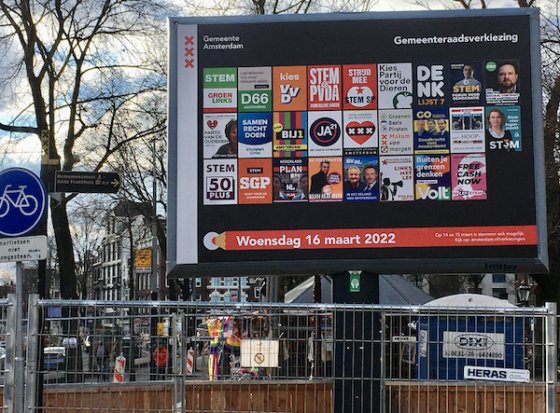Politicians are out of touch with some voters, Amsterdam survey shows


The low turnout in the March 2022 local elections is an threat to local democracy, according to researchers at the University of Amsterdam who have studied the reasons why so many voters stayed home.
In Amsterdam, just 48% of potential voters turned out, but the figure was particularly low in neighbourhoods with large ethnic minority or working class populations. In parts of Osdorp and the Bijlmer, for example, around one fifth of those eligible to vote took part.
There are several reasons for the lack of interest, but the main one is that people, especially youngsters, don’t feel represented or in touch with local politicians, head researcher Floris Vermeulen told Dutch News.
‘Voting is easy. It is more about the actual discussions and people want to be more involved. Politicians have to get out there and meet people and listen to them.’
Without action, there is a ‘real risk that we end up in a vicious circle,’ he said. ‘Politics will become something for people who are already interested and involved. They are the ones who will be listened to and the rest will feel less and less part of it.’
The local elections were also open to non Dutch nationals but they too largely stayed at home. Here too there is a risk that international workers will start to feel more estranged, Vermeulen said, even if they are only in the city for a few years.
‘There are a number of simple ways to increase their interest in the elections and it would not be a bad thing to make more information available in English,’ he said.
Unlike Groningen and Maastricht, for example, Amsterdam only provided the bare minimum of information in English for its international voters. Around 10% of capital’s potential local voters did not have Dutch nationality.
Nevertheless, the issue goes far beyond the Dutch capital, Vermeulen said. ‘This is an issue which is far broader than Amsterdam. Under EU legislation, local elections are open to all EU citizens but we have not though properly about how to do that. There needs to be a fundamental discussion about this in Amsterdam.’
Plan
The city is now working on a plan to try to improve turnout, starting with the provincial and water board elections this March. Only Dutch nationals can take part in the elections for the 12 provincial councils but everyone can cast their ballot for the water boards.
The plan includes adding extra billboards with election posters in the three areas where turnout was lowest last year. Measures are also being taken to make it easier for the blind and people with physical disabilities to vote.
‘This action plan will be adjusted after each election, based on experience and new points of view,’ a spokeswoman for mayor Femke Halsema told Dutch News.
‘Before this summer of this year, we will submit an updated action plan to the council. This will include extensive consideration UvA study recommendations and will also take communication in the English language into consideration.’
Brussels is currently working on plans which will require local authorities to take a more proactive approach to encourage EU nationals to vote.
Thank you for donating to DutchNews.nl.
We could not provide the Dutch News service, and keep it free of charge, without the generous support of our readers. Your donations allow us to report on issues you tell us matter, and provide you with a summary of the most important Dutch news each day.
Make a donation